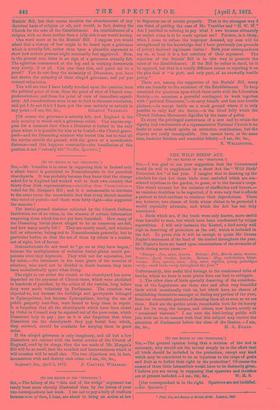[To THE EDITOR OF THE " SPECTITOR:1 SIR,—Mr. Venables is
in error in supposing that in Ireland only a silent burial is permitted to Nonconformists in the parochial
churchyards. It was probably because they knew that the change
asked for in England had worked well in their own country that thirty-four Irish representatives—including three Conservatives— voted for Mr. Morgan's Bill ; and is it unreasonable to attribute to the same cause the remarkable fact that every Scotch member who voted or paired—and there were forty-eight—also supported the measure ?
The burial-ground statistics collected by the Church Defence Institution are of no value, in the absence of certain information respecting them which has not yet been furnished. How many of the Dissenting burial-places alleged to be so numerous are full, and how many nearly full ? They are mostly small, and whether full or otherwise, belong not to Nonconformists generally, but to particular bodies, so that the use of them by others is a matter, not of right, but of favour.
Nonconformists do not want to "go on as they have begun," because the multiplication of sectarian burial-places would per- petuate what they deprecate. They wish not for separation, but for union,—the interment in the same grave of the remains of relatives, who need not be divided in death because they have been ecclesiastically apart when living.
The right to use either the church or the churchyard has never
depended on the payment of Church-rates, which were abolished in hundreds of parishes, by the action of the vestries, long before
they were made voluntary by Parliament. The exaction was objected to, not because the buildings and graveyards belonged to Episcopalians, but because Episcopalians, having the use of public property rent-free, were bound to keep them in repair. It is forgotten that all the churchyards which have been closed by Order in Council may be repaired out of the poor-rates, which Dissenters help to pay ; just as it is also forgotten that when Dissenters use the churchyards they pay burial fees, which, they contend, should be available for keeping them in good order.
If the alleged grievance is only imaginary, and all but a few Dissenters are content with the burial service of the Church of England, read by its clergy, then the use made of Mr. Morgan's Bill will be so small, that the scandals and inconveniences which it will occasion will be small also. The two objections are, in fact, inconsistent with and destroy each other.—I am, Sir, &c.,


































 Previous page
Previous page